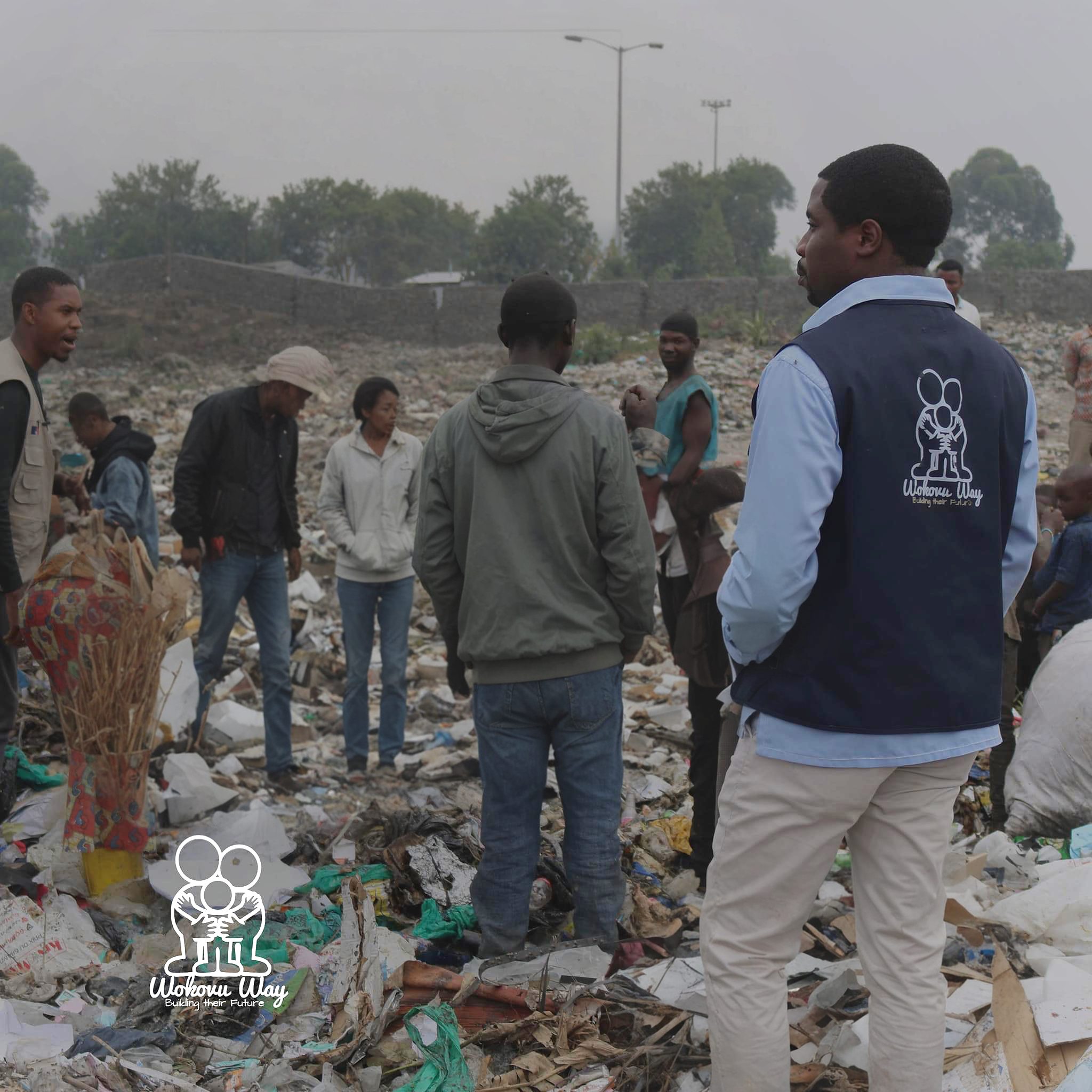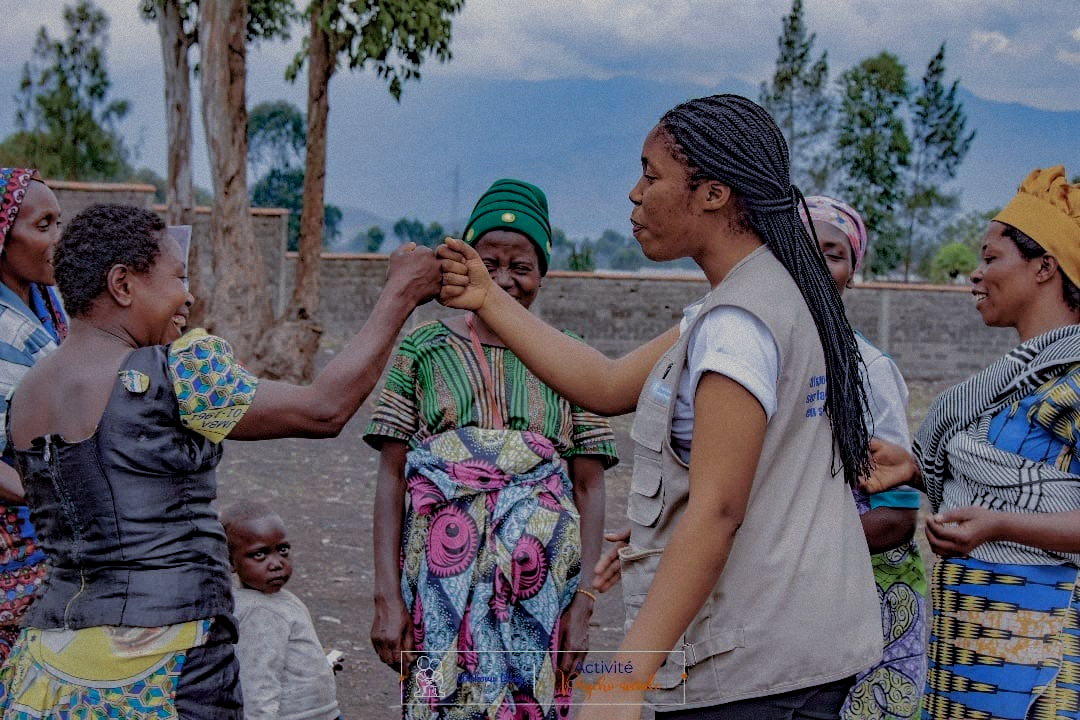ADDRESSING A HIDDEN CRISIS IN GOMA
In Goma, North Kivu, the challenges of conflict, displacement, and resource scarcity converge to make managing menstruation a daily struggle for girls and women. With over 7 million displaced across eastern DRC, including 1 million in camps around Goma as of March 2025, access to basic sanitation and hygiene products is limited. Girls miss up to 20% of school days monthly due to menstruation, while women face heightened health risks from using makeshift solutions like rags or leaves. Wokovuway, a grassroots NGO, is tackling this hidden crisis through targeted Menstrual Hygiene Management (MHM) education, empowering girls and women to navigate these challenges with dignity.
Wokovuway’s MHM program addresses the unique needs of Goma’s displaced communities, where conflict with groups like M23 disrupts supply chains and cultural taboos often isolate menstruating women. By providing practical education and resources, Wokovuway is fostering health, education, and gender equity, aligning with broader goals of empowerment in a region marked by instability. Our efforts build on partnerships with organizations like UNFPA, ensuring that girls and women in camps like Kanyaruchinya can manage their periods safely and confidently. Learn more about our mission.
EDUCATION TAILORED TO GOMA’S REALITIES
Wokovuway’s MHM education program is designed to meet the specific needs of girls and women in Goma, where water scarcity and limited resources are daily realities. In 2024, we reached over 3,000 girls and women in displacement camps and local schools, teaching the biology of menstruation to dispel myths that label it as impure. Participants learn practical skills, such as creating reusable sanitary pads from fabric scraps, a vital solution when disposable products are unavailable or unaffordable in conflict zones.
Our sessions also cover hygiene techniques suited to Goma’s constraints, like sterilizing cloths with minimal water or drying them in sunlight for sanitation. Held in safe spaces within camps like Lushagala and community centers, these workshops foster open dialogue, breaking the silence around menstruation. By equipping girls and women with knowledge and tools, Wokovuway ensures they can manage their periods independently, even amidst the region’s challenges. Read stories of impact.
NAVIGATING GOMA’S UNIQUE CHALLENGES

Goma’s environment amplifies the need for MHM education. Ongoing conflict disrupts access to sanitary products, with markets often unable to stock essentials like pads or soap. Water scarcity, a persistent issue in this volcanic region near Lake Kivu, makes washing cloths or maintaining hygiene difficult. In camps, where over 1 million displaced people live, sanitation facilities are scarce, forcing many to use unsafe alternatives that increase infection risks.
Cultural attitudes in some communities further complicate the issue, as menstruation is often seen as a source of shame, leading to isolation. Wokovuway addresses these barriers by engaging community leaders and men through our partnership with MenEngage Alliance. In 2024, we trained 500 men and boys in GBV prevention and MHM awareness, helping to shift societal norms and create a supportive environment for girls and women to manage their periods without stigma. Support our efforts.
IMPROVING HEALTH AND HYGIENE

Wokovuway’s MHM education has a direct impact on health and hygiene in Goma’s displaced communities. By teaching safe hygiene practices, we reduce the risk of infections caused by using unclean materials, a common issue in camps where water and soap are scarce. In 2025, alongside UNFPA, we distributed dignity kits to 5,000 women in Kanyaruchinya camp, including sanitary items that support menstrual hygiene and lower infection rates.
These efforts alleviate pressure on Goma’s overburdened healthcare system, where preventable infections strain limited resources. Women in our programs report feeling more confident and comfortable during their periods, allowing them to continue daily activities like working in markets or caring for their families. By addressing menstrual health, Wokovuway contributes to the overall well-being of Goma’s women, fostering resilience in a challenging environment. Explore UNFPA’s work.
BOOSTING EDUCATION AND EQUITY

MHM education directly supports educational outcomes for girls in Goma. Missing up to 20% of school days monthly due to menstruation can derail academic progress, perpetuating cycles of poverty. Wokovuway’s program ensures girls have the tools and knowledge to manage their periods, enabling them to stay in school. In 2024, we supported 1,500 girls in Lushagala camp with MHM training and reusable pads, leading to a reported 30% reduction in absenteeism among participants.
Beyond education, our work promotes gender equity by challenging cultural norms that marginalize menstruating women. By involving men and boys in discussions, we foster understanding and support, creating safer spaces for girls to thrive. This aligns with Wokovuway’s broader mission to empower women, as seen in our tailoring programs, where women like Esther gain financial independence while benefiting from MHM education. Join our empowerment initiatives.
BUILDING A FUTURE OF DIGNITY
.jpg)
Wokovuway is committed to expanding MHM education in Goma, ensuring more girls and women can manage their periods with dignity. By 2026, we aim to reach 10,000 girls across five major camps, providing MHM training, reusable pads, and hygiene kits. We also plan to partner with the International Rescue Committee (IRC) to improve water and sanitation infrastructure, addressing the root causes of hygiene challenges in camps.
Our vision is a Goma where menstruation is no longer a barrier to education, health, or equity. By continuing to challenge stigma, provide practical solutions, and engage communities, Wokovuway is paving the way for lasting change. In a city shaped by conflict and disasters like the 2002 Nyiragongo eruption, these efforts build resilience, offering girls and women the tools to turn a routine biological process into an opportunity for empowerment. Help us create a future of dignity.
